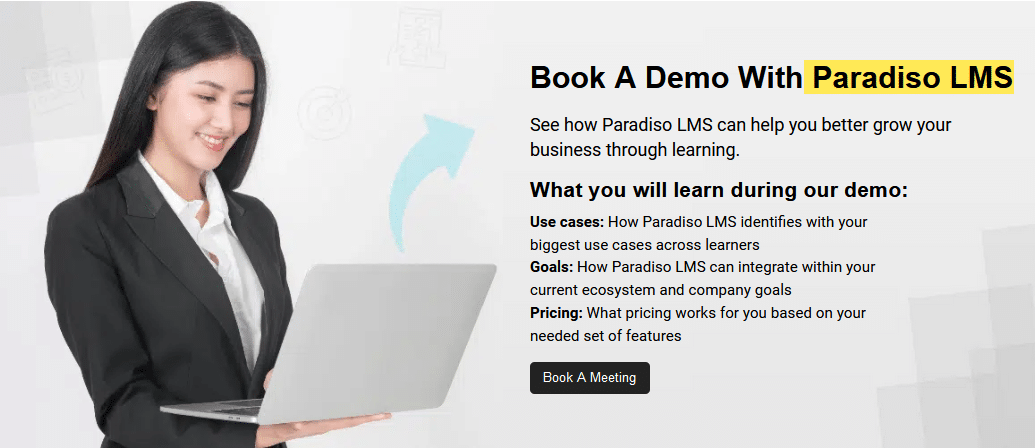The healthcare sector is evolving rapidly, and it must be up to date to meet patient demands. Healthcare facilities also need to prioritize employee learning and development to foster a culture of continuous learning. This includes giving the employees access to professional skill development tools, continuing education classes, and more.
How to Implement an LMS in a Healthcare Organization?

The idea to implement an LMS (Learning Management System) in a healthcare organization is an evolutionary step toward enhancing the efficiency and effectiveness of training and development programs. An LMS offers a centralized platform for managing and delivering educational content, ensuring that healthcare professionals stay abreast of the newest medical knowledge, compliance requirements, and best practices.
Empower Healthcare professionals with LMS
An LMS provides a flexible and accessible platform for continuous education, allowing healthcare workers to stay current with the latest medical advancements, compliance regulations, and best practices. Through interactive and multimedia-rich content, professionals can engage in more effective and personalized learning experiences.
This not only boosts their skills and confidence but also ensures higher standards of patient care. By leveraging the capabilities of an LMS, healthcare organizations can cultivate a knowledgeable and competent workforce, ready to meet the dynamic challenges of the medical field.
What is LMS healthcare?
A healthcare LMS is a specialized digital platform designed to manage, deliver, and track educational and training programs for healthcare professionals. With the LMS healthcare training platform, you can apply practical training more effectively, organize training courses, track learners’ progress, and improve the learning and training experience while reducing costs. In addition, the hospital’s learning management system ensures that your employees have access to appropriate data whenever they need it.
What other needs can be achieved by implementing LMS in Healthcare?
The best LMS system for healthcare provides relevant and cost-effective training to their personnel to ensure that they remain qualified and in compliance with current healthcare regulations and standards.
Let’s examine what additional needs healthcare companies may have met by using their healthcare learning system.
The in-person training will save you money, time, and energy.
-
- You might require less individualized education if the hospital uses a learning management system. It also saves your company money, time, and energy by allowing you to teach multiple staff members at once, which is particularly helpful for companies with different staff shifts.
Enables trainers to plan learning activities at any moment.
-
- Physicians’ work is quite demanding and has availability constraints. Moreover, with the help of the hospital learning management system, administrators can plan and oversee educational procedures from any location at any time.
Content accessibility for educators and students
- While there is no denying the value of traditional learning resources like tablets, copybooks, posters, and maps, there is also a significant risk of them being misplaced or broken. Instead, information is made available to learners via healthcare learning systems through URLs, PDF files, podcasts, videos, ppts, audios, and other formats.
How can LMS benefit a healthcare organization?
One should not hesitate to implement an LMS in healthcare organizations since it has a plethora of benefits, such as streamlining training processes, ensuring compliance with regulatory standards, and enhancing the knowledge and skills of healthcare professionals. Additionally, an LMS can automate administrative tasks, track certifications, and generate detailed reports, leading to increased efficiency and better patient care outcomes.
- Streamlines training processes: Centralizes all training materials and programs, making it easier to manage and deliver educational content to healthcare professionals.
- Ensures regulatory compliance: Helps track and manage compliance training, ensuring that staff meet industry standards and regulatory requirements such as HIPAA.
- Enhances knowledge and skills: Provides continuous education and up-to-date information on medical advancements and best practices, improving the expertise of healthcare professionals.
- Provides flexible, accessible learning: Allows healthcare staff to access training materials anytime and anywhere, accommodating their busy and variable schedules.
- Improves knowledge retention and engagement: Utilizes interactive and multimedia-rich content, which makes learning more engaging and effective, leading to better retention of information.
- Automates administrative tasks: Reduces the burden of manual tasks like scheduling, tracking attendance, and generating reports, freeing up time for administrators and educators.
- Tracks certifications: Keeps records of certifications and compliance training, sending automated reminders for renewals to ensure all staff maintain their qualifications.
- Generates detailed reports: Provides insights into training progress and performance through comprehensive analytics, helping to identify areas for improvement.
- Increases efficiency: Streamlines training management and reduces redundancy, leading to more efficient use of resources and time.
- Improves patient care outcomes: Ensures that healthcare professionals are well-trained and knowledgeable, directly contributing to higher standards of patient care and safety.
Conclusion :
Implementing an LMS in a healthcare organization can significantly enhance the efficiency and effectiveness of training and professional development. By providing a centralized platform for learning, an LMS ensures that healthcare professionals have access to the most current information, protocols, and best practices. This not only fosters a culture of continuous improvement and compliance with industry standards but also contributes to improved patient care and safety.
Ultimately, to implement an LMS in healthcare is to invest in the ongoing education and competency of healthcare staff, leading to better health outcomes and a more resilient healthcare system.
One well-known healthcare LMS, Paradiso LMS, offers transformative benefits that streamline training and boost staff performance. Paradiso LMS provides a robust and user-friendly platform tailored to meet the unique demands of healthcare environments. By leveraging its comprehensive features, healthcare organizations can ensure that their staff stays updated with the latest medical knowledge, regulatory requirements, and best practices.












